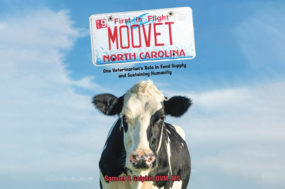Indiana dairy farmer Mike Yoder’s offhand comment to a Reuters reporter sparked newspaper articles, an interview on Fox TV and a Saturday Night Live mention. How did the first story, the Reuters article titled ‘Sweet times for cows as gummy worms replace costly corn feed,’ come about? That was accidental. It started in the middle of the summer when Reuters called me about a drought-related story. I just made an offhand comment that we were feeding ice cream sprinkles to help reduce feed cost – I shared with him [the reporter] that it’s not an unusual practice in the cattle industry to feed bakery products.
Later they called back and did a story and I was quoted. I had one line at the top of the article. Most of the article was spent talking with professionals in the feed industry. Basically it just said I was feeding ice cream sprinkles to replace a small percentage of the ground shelled corn in the ration.
That article went out on a Friday. On the following Monday or Tuesday, within a 20-minute period I had Fox Business and CNBC calling me, wanting to do live interviews. I said “yes” to both and later discovered they each wanted an exclusive interview. Fox won because their broadcast time better coincided with my schedule.
How did the Reuters reporter find you as a source in the first place?
Maybe the Indiana Farm Bureau – I am a long-time member and served nine years on the state board of directors. Indiana was one of worst-hit areas for drought … the Farm Bureau was receiving lots of calls from all sorts of media wanting to do interviews with farmers – I guess I was in the rotation.
How did you prepare for these recent interviews?
It didn’t take much on my part. As a county commissioner, I do a lot of interviews locally – TV, radio and newspaper – and I’m familiar with the importance of communicating to the general public positive messages about farms and how we care for the animals.
For these interviews, you prepare the same as for any other ag or livestock interview – prepare to talk about balanced diets for the cows, the differences between a rumen and a human stomach … how it doesn’t matter to rumen bacteria if the basic nutrients are from corn, hay or sprinkles. Using non-farmer-friendly language, so terminology like “balanced diets” instead of “balanced rations.”
Were you satisfied with how the TV interview turned out?
I had a 30-minute discussion with the producer of the Fox Business program, a pre-interview. I think he wanted to make sure I could communicate at least halfway intelligently. We had a great discussion, talked about the various ways the host could do the story. The potential bacon shortage story was hot that day and we talked about how the drought and low corn yields could affect the availability and price of many meat products.
The show’s host didn’t use any of this material. For example, I had discussed with the producer the fact that using bakery products is a very common practice in feeding cattle. Yet the host’s introduction to the segment with me was an extreme hyperbole, something like “This farmer being innovative, creative ...” and ending with a question along the lines of “How did you ever come up with this idea?”
Also, although I have done live local broadcasts in the past, this situation was much different. I’m in South Bend, Indiana, and they’re in New York. I am in a dark room with a bright light shining at me, looking into a TV camera, with an earpiece so I can listen to the show.
Without being able to see the host or myself, it was very difficult to judge reactions and how I was being presented. It was a new interview setup for me, but one that I felt I could adapt to pretty quickly. However, I had about two minutes and the host did most of the talking.
Were there any benefits to the time you spent participating in these interviews, like improving the public’s perception of the dairy industry?
No, I don’t think there was. I initially thought it would be a good opportunity. However, most people just thought it was a weird story. To most of America, it was funny that cows were eating ice cream sprinkles – it resulted in a Saturday Night Live mention.
On the negative side, at least one animal rights website picked it up as another way to talk about how we mistreat animals. PD





